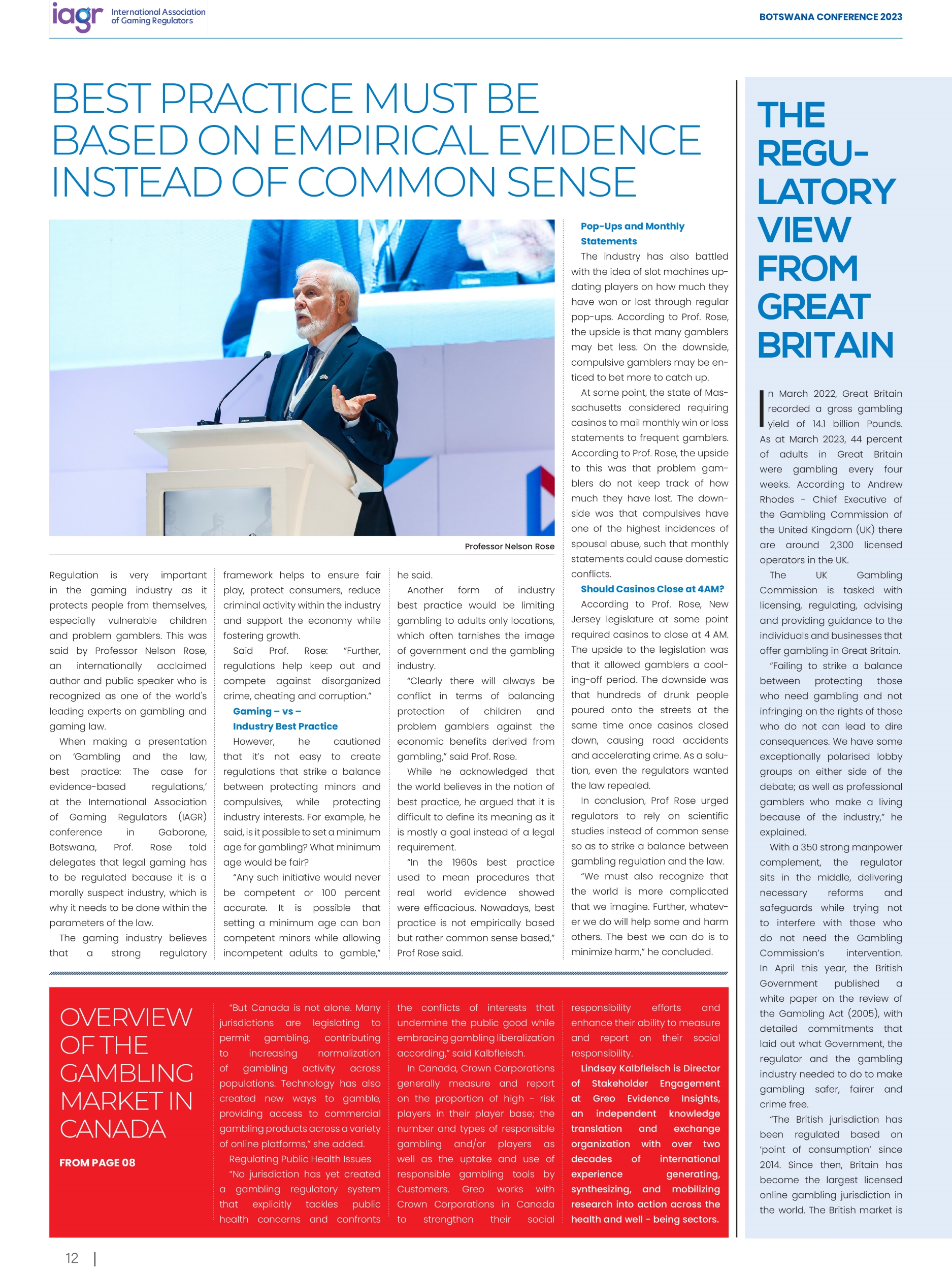In the past few years, I testified as an expert witness in two major hearings where “best practices” had important and surprising roles.
The Bergin Inquiry reexamined the entire system of regulating casinos in New South Wales, Australia. Five years earlier, NSW had hired an outside firm to review and rewrite its casino regulations. It did so, based on the startling idea “best practices” requires “risk‑based regulation,” meaning basically casinos should self-regulate.
World Capital Ventures Cyprus Ltd. v. The Czech Republic was a hundred-million-dollar international arbitration brought by operators and suppliers of gaming devices after the national and local governments ordered half of all slot machines in the country removed. The industry expert testified that “best practices” means the minimum amount of regulation needed to create the maximum amount of gaming revenue. And, because “best practices” had not been put in place, he concluded that all government actions had to be reversed.
My major contribution to the Bergin Inquiry was that casinos were not adult Disneylands. The Bergin Report adopted all my conclusions, which were then adopted by Parliament, including creating the NSW Independent Casino Commission. The idea of casino self-regulation received a fatal blow when the Crown Resorts chair admitted its casinos laundered money, allegedly due to lack of oversight. Crown’s failure to carry out due diligence on high-rollers, some with ties to organized crime, resulted in a fine of $450 million.
I testified in The Czech Republic case that legal gaming is regulated not to protect the industry, but to protect the public, especially the “vulnerables:” children and problem gamblers. Organized Crime must be kept out, and so does disorganized crime, including cheating. Economic benefits, including jobs and tax revenue, are real, but always the least important goal.
To counter the slot operators’ expert on the legal impact of not following “best practices,” I researched casino and gaming machine statutes and regulations around the world. “Best Practices” – a plural word usually treated as a single noun – is never a legal standard. Regulators may be required to exercise due process and follow their own procedures. But even if everyone could agree on what is a “best practice,” failure to use or require that practice is never grounds for challenging a law or rule.
I recently returned from speaking at the International Association of Gaming Regulators conference in Gaborone, Botswana. I spoke right after His Excellency Dr. Mokgweetsi E.K. Masisi, President of the Republic of Botswana, who had a military band. Besides the national anthem, they played a jazzy version of “Yellow Bird.”


My presentation, “Gambling and the law®: Best Practice: The Case for Evidence‑Based Regulations,” was based on these two cases.
It is easy for those of us who work with operators and regulators to forget how controversial gaming can be. Legal gambling is a morally suspect industry. A minimum of one-third of the population are opposed to it for religious or historical reasons, and they especially do not want it in their own backyards. That is why local governments always have a say on whether slot machines or casinos will be allowed in their locales.
“Best practices” is difficult to define, although we all believe in it. But there has been a shift in the last half century. It used to mean, in the 1960s, procedures that real‑world evidence showed were efficacious. Today, “best practices” is often used to describe laws and regulations that are not empirically based but rather appear to be “common sense.”
This is easiest to see in the requirement imposed by the New Jersey Legislature before the first casino opened in Atlantic City, that all the casinos had to close at 4 am. This appeared to be common sense: Gamblers would be given a cooling‑off period. What was not foreseen was the hundreds of drunk and exhausted people being dumped on the streets all at the same time. The casinos argued for years that they did not make money from gamblers at four and five in the morning; but they did not want their customers to be the victims of street crime or killed in auto accidents. Even the casino regulators wanted the rule eliminated. But it took years because it had been imposed by legislation not regulation.
Should slot machines be required to tell players how much they have lost? An early study showed that almost every player lost less money with pop-up warnings. Except for one group: Compulsive gamblers bet more, chasing to try and catch up.
It looks like the UK is about to impose a £5 limit on internet slot machines. When other jurisdictions have tried this, operators successfully argued that every betting line on the slot machine is a separate wager. So, if slot machines allow three lines on their spinning reels – top, middle, and bottom – players can bet £15 at once. If they allow 100 combinations, players can bet £500 every four seconds.
Legal requirements have often been placed on casinos, which looked like common sense, until they blew up. These led to my conclusions:
- Respect the law of unintended consequences;
- Don’t rely on common sense, do scientific studies;
- Recognize the world is more complicated than we imagine; and
Whatever we do will help some and hurt others – try to minimize harm.
The entire conference, including my presentation, is available for sale by IAGR on their website: https://iaogr.wildapricot.org/event-5266541
IAGR did a write up on my recent speech in Botswana. Read more below:






0 Comments